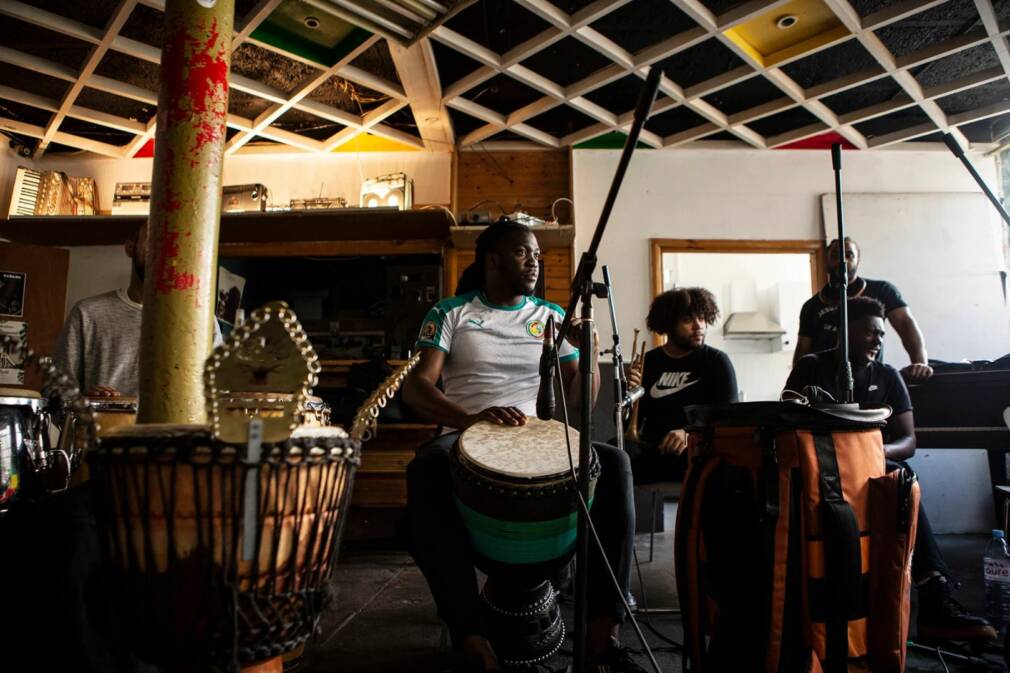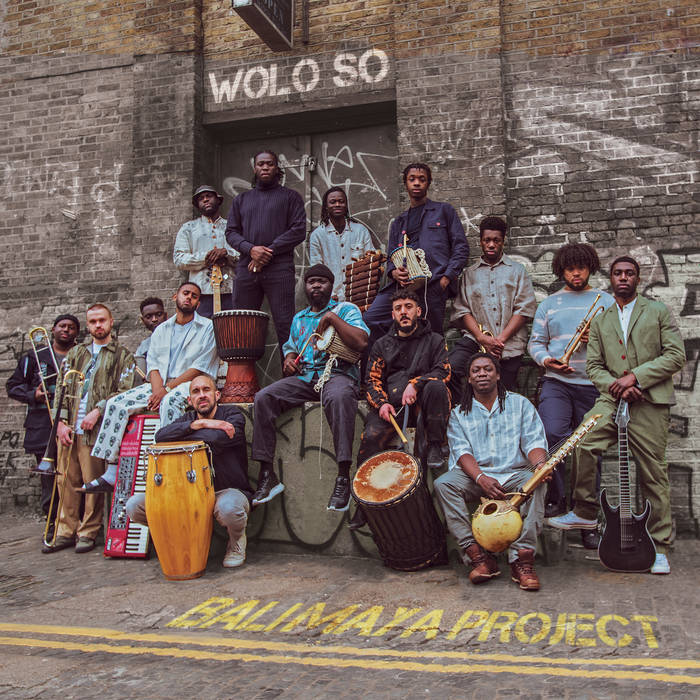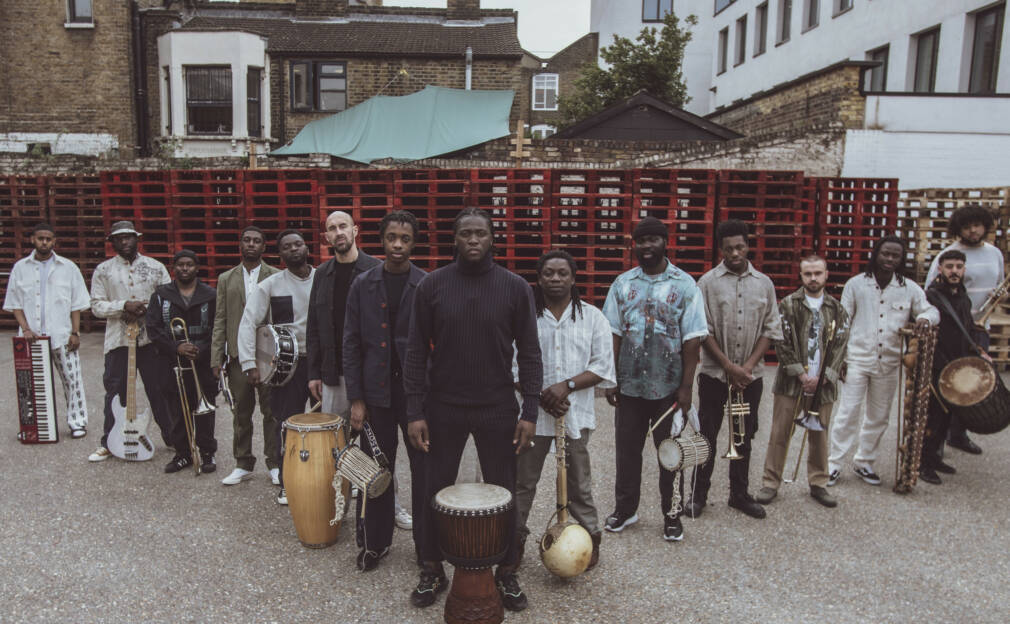“I can safely say I bring the Manding participle” says Yahael Camara Onono referring to the music and musical instruments of the pre-colonial Manding empire and the lineage honoured in Balimaya Project.
Surveying the budding London jazz scene back in 2019, Yahael went about this mission by gathering a who’s who of the capital’s players together to form the sixteen strong fraternity and dial classical West African music back into UK jazz by putting folkloric instruments front and centre.
A pan-African collective whose members pool heritage from Senegal, Gambia, Congo, Nigeria, Cuba, Ethiopia and the Caribbean, Balimaya Project are about to get very busy with gigs in London to round off 2021 and European dates to be added for 2022.
And with another album on the way, we decided to jump on a call with Yahael to get the story so far.
Tell us about your own musical formation?
I grew up in North West London and I was very lucky to have the traditional community around me. So things like naming ceremonies and the way in which the drums and folklore practice will be used in different kinds of events like marriages, naming ceremonies and funerals, I was very much involved in. When I’d see drummers I was always drawn from a very young age and as a kid they say I was always playing on pots and pans and stuff like that. Then my grandfather, even though he wasn’t a musician by trade (he played traditional music and could play the tama) he saw me playing around and saw that I could already distinguish and create notes so he went out and bought me a tama and from then on, that was my drum! I went everywhere with it. That was my toy, so for example when you come back to school after the summer holidays and they do the show and tell – I would bring my talking drum.
Then my Mum got me my first djembe at around the age of seven or eight and I loved it. From then I loved everything djembe, I was djembe crazy! I did my first gig at jazz re:freshed at the age of 16 with my aunt who is an emcee and spoken word artist and I also started to play for dance classes. Then in my late teens I met Sidiki Dembele who is an amazing djembe player based in Manchester from the Ivory Coast but of Malian origin. He saw what I was doing and said: “You can do this, you can dance, you can sing, you can play, but you’re not taking it seriously!” I was in uni at the time but didn’t really want to do University and my eyes were on performing but I wasn’t yet sure until Sidiki said: “Just go for it!” and from there he put me on the formation as if we were back home.
So I stayed in his house the same way if you traditionally have a djembe master that you go to your master’s house and stay as if you’re one of his children. So I did that in my late teens and I was in Manchester for two years.
So it’s gone from there. I’ve played with so many different people. I was lucky to play with Family Atlantica, with Baaba Maal, I’ve been on stage with Cirque Du Soleil, with the RSC, and with the National Theatre. I’ve been on stage with so many different productions and bands that were budding on what you could call the London jazz scene.

How did you go from being a djembe fola for hire to gathering this band around you and being a leader and an arranger?
First of all, I always like to say that being a great djembe fola and being a great musician can be seen as two different things.There are those djembe players that are great in a djembe context but unfortunately, because they don’t play a lot of other styles of music they can’t apply that djembe to other styles. They’re amazing when it comes to traditional ceremonies but when it comes to other situations like playing with a funk band for example, your technique must change for each genre that you’re playing.
Secondly, I will say that in terms of leading, the djembe is a lead instrument. If you go back home today, a lot of musical ensembles may have a kora or a balafon but the djembe player is the M.D (musical director) as they have to understand the timing of the songs, the repertoire, and guiding the dance. Djembe is in fact the glue that holds everything together. and dictates the arrangement.
Then as for how I had the idea for my project and why I called everyone together? For a long time I was seeing how West African music or Manding music in general was such an influence on London jazz music or call it what you will. But in its truest sense, it should be done by those people who are masters of their craft, if that makes sense. I can safely say that I bring the Manding participle. Of course I’m growing and learning like everyone else, but I can safely say that I can bring something of my own and my own creations. But I need help. I cannot play congas for example but I would like congas to be in there and I would like them to be valorised. And it’s the same with all the instruments and musicians in Balimaya who I’m lucky to call friends and brothers. It’s like almost like let’s take the best of what we do and combine and valorise what our culture is but also spotlight a new one that you’re not used.
How important have Jazz re:freshed (Iconic London label that grew out of a music residency) been to Balimaya and the wider scene?
Jazz re:freshed have been the nucleus of the London scene. They were the people that put on new artists, that have given artists and a way of succeeding are always encouraging and offering support to Black up and coming artists, female artists and anyone who is marginalised in any way with a very honest and open way of working. I’ve known Adam since I was 15 or 16 and they’ve been steadfast and consistent in the way in which they speak and fight for the musical community and the wider community in ensuring that Black musicians are given the space to express themselves at a standard and a level that is becoming of them.
Wolo So by Balimaya project, still available.





